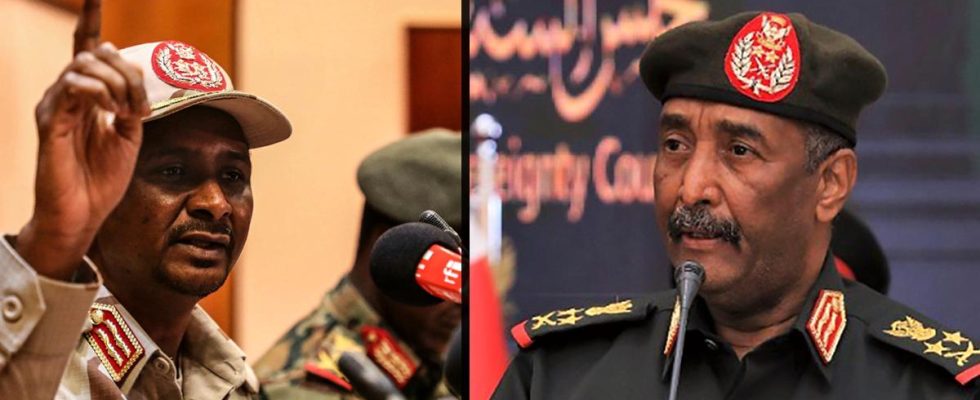Published: Less than 50 min ago
Updated: Less than 20 min ago
Two years ago, the military generals took over Sudan in a joint coup d’état.
Now the country is being torn apart as a result of their power struggle.
This is the story of the dreaded Abdel Fattah al-Burhan and Mohamed Hamdan Dagalo, and their journey from cronies to rivals.
Hundreds of people have died and thousands have been injured as a result of the fighting in Sudan. The battle takes place between two generals who each lead a military force.
In one corner of the ring stands Abdel Fattah al-Burhan, head of Sudan’s armed forces and who basically leads the country today. He says his rival is responsible for looting in the capital and past massacres of civilians.
In the other stands Mohamed Hamdan Dagalo, today known as Hemedti. He is the commander of the paramilitary group RSP, and has al-Burhan as his rival for leading a “radical Islamist gang”.
It is only two years since the two men consolidated their power in a joint coup d’état. They have fought side by side for over 20 years, but now fight each other to strengthen their own power.
Have both collaborated and competed
Mohamed Hamdan Dagalo dropped out of high school and was a camel trader when civil war broke out in the Darfur region in 2003, an area where he himself grew up.
He quickly rose through the ranks of the Janjaweed militia and became a leader. The militia was responsible for much of the ethnic cleansing that happened during the civil war. There he met Abdel Fattah al-Burhan, who came from Sudan’s traditional elite in Khartoum, who then led the military.
– They have cooperated for a very long time, but they have also competed for power, says Johan Brosché, docent in international relations at Stockholm University.
16 years later, in 2019, longtime dictator Omar El-Bashir, who had ruled the country for 30 years, was ousted following popular protests. After that, the military went in and arrested him.
Both al-Burhan and Hemedti sat on a newly established transitional council, with both civilian leaders and the military. The idea was that power would be shared, but in reality the military held the highest position. It was consolidated in 2021, when Hemedti and al-Burhan seized power through a joint military coup. They deposed or imprisoned all civilian leaders who had been part of the transitional government.
They have been driven by the same agenda, that the military should retain power.
– If there is a democratic government, then the warlords will have less to say to them. As long as the civilians were kept away, then they could cooperate, says Johan Brosché.
Purpose: Maximize power
In the spring of 2023, democracy once again knocked on the generals’ door, and civilian leaders began to request influence and debate how the military should be organized.
That’s when the fighting broke out.
But the two men do not agree on how the country should be governed – and have instead turned their military both against each other and the civilian population.
– When positions of power can change, it becomes a risk. As they cannot agree on this and tensions increased, fighting broke out. They got very intense quickly, they both had a lot of weapons and were well organized, so there could be a lot of fighting quickly.
Whoever wins will likely be the one who will lead the country.
– Their aim is to get as much power as possible. Both have very large economic and political interests in maintaining power.
“The situation is terrifying”
Sudan is a very large country, four times the size of Sweden. The fighting is centered around the capital, but is also going on in other places. There is a great risk that the fighting will spread to other countries in the region, such as South Sudan and Chad.
In recent days, several countries – including Sweden – have begun an evacuation of citizens and embassy staff. It is not only necessary, but something that all countries have a responsibility to do, says Brosché.
– But once it’s done, it’s important to try to push as much as you can to get a truce.
Right now, the population is extremely vulnerable, with a lack of food, water and electricity.
– There are people who have died in intensive care units because there has been no electricity, and the fighting is so intense that it is difficult for aid organizations to enter.
Johan Brosch is pessimistic about Sudan’s near future.
– There is very little that indicates a relatively quick solution. The situation is horrendous and the absolute most likely thing is that it will continue to be so for a good while to come.
